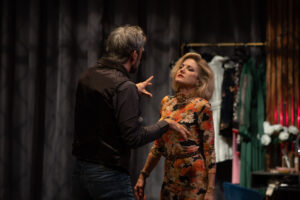Bad Kitty
A lackluster revival of a Williams classic is littered with missteps.
BY CHRISTOPHER BYRNE
The fatally flawed and unrelievedly tedious production of Cat on a Hot Tin Roof now at St. Clement’s is making (limited) headlines as the first time the Tennessee Williams estate has allowed the play to be produced Off-Broadway. One wonders why this is news, given that the play has been done on Broadway numerous times and is a fixture in regional and college theaters.
Nevertheless, here it is, and a remarkably turgid affair it is, too. This is largely due to director Joe Rosario’s misreading of the text, some serious miscasting, and clumsy staging. Cat… is a play about power, secrets, sex, and the ways they all conspire in a highly dysfunctional family in the home of patriarch Big Daddy in Mississippi.
Brick, faded athlete and alcoholic, is married to Maggie, known as “the cat.” They exist in a state of mutual loathing. Brick can’t find himself attracted to Maggie, and Maggie, having married up into a wealthy family from poverty, is not going to let go of what she’s achieved. She questions whether Brick’s relationship with his college buddy Skipper, who has recently committed suicide sending Brick into despair, was more than platonic is the reason Brick won’t sleep with her. Meanwhile, the family is lying to Big Daddy—and wife Big Mama—about the fact that Big Daddy is dying of cancer. Brick’s older brother Gooper and grasping wife Mae are angling to control the family fortune and cut out Brick and Maggie. This is not a happy family.

Yet where Rosario goes so wrong is with the portrayal of Maggie. In his direction, she comes off more as a kitten than a cat. Maggie is watchful, conniving, waiting for her chance to pounce—which she finally gets. Yet Rosario has her in the first act—a long argument between Brick and Maggie—jumping on furniture, bordering on manic and desperate. This is almost a polar opposite from what Williams wrote. Maggie didn’t get where she was by being cutesy. Maggie by virtue of her history is much more cocotte than coquette. (A cocotte is a prostitute, whereas a coquette is an, often silly, flirt.) Her marriage to Brick was clearly a one of those age-old marry-for-money affairs, but she will fight to protect that; we should sense that among all the aristocratic graces of Brick’s family, she’s a scrappy street fighter, who knows her way around a fight.
That fire, depth, and spirit are nowhere to be seen in the performance of Courtney Henggeler as Maggie. She gives an uncontrolled and unfocused performance that has all the complexity and nuance of a tantrum-prone contestant on The Bachelor sent packing in week two. She also speaks in some generic southern accent that is largely unintelligible. (There is no dialect coach credited, and that’s obvious in the other performances as well)
Nor is Henggeler helped by the misguided costumes by Ruth Stage. From Barbara Bel Geddes in the original production to Scarlett Johansson in the most recent Broadway revival ten years ago, Maggie plays the first act in a slip, a one-piece garment, that allows her to move sensually, that flows with her movements and Maggie’s acquired—if not native—studied grace. Ruth Stage has bound Maggie into an ugly, two-piece bit of lingerie that forces her to stalk like a dominatrix or bounce like a gymnast rather than slink like the eponymous feline. Maggie can put on the silks, but she’s tough underneath; that’s where the drama happens. When all we see is the toughness, something is lost—and it’s hard to sympathize with her.

The rest of the cast doesn’t fare much better. Matt deRogatis is miscast as Brick. Physically, he isn’t built like a football star, and there is zero chemistry between this Brick and Maggie. Although that chemistry is largely expressed combatively the tragedy is that these two highly sexual and beautiful people are stuck with one another. Where there should be sparks, the relationship between this Brick and Maggie is a wet match that will never ignite.
The rest of the cast doesn’t fare that well either. Adam Dodway is lost in the small part of Gooper, and Christine Coplay is simply strident as Mae (with an incongruous hairstyle that is insanely distracting). Theater veterans Frederick Weller and Alison Fraser fare best as Big Daddy and Big Mama. Weller has the power—and the appeal—the others lack, and one wonders whether or not a few years ago he would have been an exceptional Brick. Fraser plays Big Mama’s desperation and denial with just the right amount of mostly suppressed hysteria the role demands. Unfortunately, it’s incongruous that they haven’t cut the lines about Big Mama being fat, since Fraser is in top shape and elegant, but the Williams estate is adamant about not cutting lines. (It’s why the libretto for the opera of A Streetcar Named Desire is so text heavy.)

When the production finally limps along to its end, one is left wondering why anyone would want to do this play today. The issue of Brick’s possible homosexuality isn’t the threat it would have been in 1955, for example. Yes, power games can always be intriguing, but Rosario’s production is much more The Real Housewives than Game of Thrones, and one is left with the intense desire merely to shoo this Cat… away.
Cat on a Hot Tin Roof
Theatre at St Clement’s
423 West 46th Street
Mon, Weds-Fri 7 p.m.; Sat 8 p.m.; Weds, Sat 2 p.m.; Sun 3 p.m.
Tickets from $67 on Telecharge.
2 hours, 45 minutes, 1 intermission, 1 pause
Production photos by Miles Skalli
Published March 3, 2023








More Stories
Off-Broadway Review: Trophy Boys
Broadway Preview: Lewis Flinn’s Cabaret
Off-Broadway Revew: The Imaginary Invalid